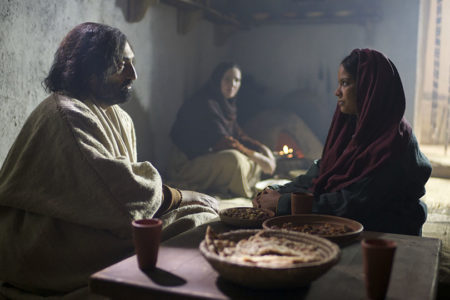Godly Women Who Made a Difference
When the Spirit was poured out on the day of Pentecost, it indwelt each member of that small group of believers in Jerusalem, including the women. Among them were Jesus’ mother Mary and the other women who were followers of Jesus, had been with Him at His crucifixion, and were the first witnesses of the empty tomb (Lk. 23–24). This event is explained by Peter as a fulfillment of Joel 2 in the sense that the Spirit, according to the New Covenant, has now been poured out upon “all flesh”—men and women alike—as opposed to the Spirit being given only to certain anointed people under the Old Covenant. Some examples are Dorcas in Acts 9:39 and Philip’s four daughters in Acts 21:9. The point is that under the New Covenant, women are equal recipients of the Holy Spirit and thus are equal with their male counterparts in the sight of God and are of equal value to the Lord and the church.
With this as a theological background, this article highlights five women who played significant roles in the ministry of the church during the apostolic period. They are Lydia, Phoebe, Priscilla, Lois, and Eunice.
Lydia: First Convert in Europe
Lydia is a wonderful example of a woman who, through belief in the Old Testament, was led to her Savior. She then used her position as a businesswoman to help establish the church in Philippi and support Paul as he spread the gospel. When Paul first came to the Roman colony of Philippi in Macedonia, he found a group of women who had gathered to pray to the God of Israel out by the Gangites River because there was no synagogue. Paul shared the gospel with them, and one of the women, Lydia, believed his message about Jesus. Thus Lydia was Paul’s first recorded convert on the European continent.
Lydia was not a native of Philippi, being from Thyatira in Asia Minor, the area that was also called “Lydia.” She was a businesswoman who was part of a cooperative that sold purple garments made from a special dye (Turkish red) made in Thyatira. Before Lydia came to Philippi—perhaps while still in Thyatira—she had come in contact with Jews and had become a convert to Judaism. When she heard Paul’s message about Jesus, she believed in Him, and she and her “household” (probably her attendants and/or servants who also believed) were baptized and became the first constituents of the church in Philippi.
Lydia’s influence in this fledgling congregation was immediately felt. On the very day that she found salvation, she invited Paul and his companions to her home, where they stayed and ministered until Paul was driven from Philippi by the city officials. When Paul left the city, the early congregation of that church most likely met in Lydia’s home. In Paul’s letter to the Philippians, written 12 years later, Paul thanked the church because they were the first one in Macedonia to financially support his ministry (Phil. 4:15–16). Undoubtedly Lydia was involved in this ministry of supporting Paul, which the church continued throughout his lifetime.
Phoebe: A Servant of the Church
Phoebe is mentioned only once in the New Testament (Rom. 16:1–2), but she seems to have played a very important role for Paul and the church. It is almost certain that Phoebe was a Gentile because her name means bright or radiant, which was associated with the Greek god Apollo. She was from the church in Cenchreae, a seaport seven miles east of Corinth. She apparently became known to Paul during his ministry there. Since she is mentioned in Paul’s commendations and salutations at the end of his letter to the Roman church, which he wrote from Corinth, Phoebe probably carried this letter to Rome for Paul. If this is true, consider how important her fulfillment of this task was to the future of the church.
Paul commended Phoebe to the Roman church and asked them to “receive her in the Lord” and “assist her in whatever business she hath need of you.” Paul did not elaborate on what help she needed, but he did elaborate on the reason why the Roman church should help her: she was a true servant of the church.
Paul expressed this by introducing her as “a servant of the church… at Cenchreae” and by indicating that “she hath been a helper of many, and of myself also.” In both of these commendations, Paul used Greek words that point toward practical service. The word translated “helper” is prostatis, which refers to a woman—possibly one of means—who looks after the welfare of strangers and the poor. Thus, Phoebe was more than just a regular helper; she was more of a patroness who was responsible for caring for the needy in Cenchreae, which, as a seaport, was in need of such a ministry. Following this interpretation, many translate the Greek word diakonos in Paul’s introduction of Phoebe as deaconess. The word diakonos simply means a servant or helper. Paul’s use of the word here may indicate that Phoebe had a recognized responsibility in the church, which is inferred by his use of this same word in Philippians 1:1 and 1 Timothy 3:8, 12. Phoebe served the church in this position and had ministered to Paul in such a way that he could entrust her with a most precious epistle and commend her heartily to the Roman church.
Priscilla: Partner in the Ministry
Priscilla and her husband Aquila were Jewish friends and co-workers of Paul. This couple worked together with him not only in the tent-making and leather-working business, but also in the ministry of the gospel. Paul met them in Corinth on his second missionary journey, six months after he left Phillipi. Aquila was originally from Pontus in northern Asia Minor, and the couple had been living in Rome. There was a disturbance in Rome’s Jewish community in 49/50 A.D., at the “instigation of Chrestus” (as the Roman historian Seutonius put it), and Emperor Claudius expelled the Jews from Rome. (Possibly this was a disturbance among the Roman Jews about Jesus being the Messiah or Christos.) Paul, meanwhile, had left Silas and Timothy in Thessalonica. Alone in Corinth and in need of money, he offered his tent-making skills to Priscilla and Aquila, and they hired him.
It seems that Priscilla and Aquila were believers before Paul met them, and after he began working with them, they became his partners in ministry. Paul stayed for a year and a half in Corinth, and his relationship with Priscilla and Aquila was such that when he left Corinth to visit Ephesus on his way to Jerusalem, they accompanied him. Paul left them in Ephesus, where they had a great influence in the church by further instructing Apollos in the gospel. It is quite a testimony to their effective ministry that they were able to better instruct Apollos, who was “mighty in the scriptures” (Acts 18:24).
When Paul returned to Ephesus a few years later, he conveyed in his letter to the Corinthian church Aquila and Priscilla’s greetings, together “with the church that is in their house” (1 Cor. 16:19). This kind of leadership and hospitality seems to be the couple’s gift, for at the end of Paul’s letter to the Romans he greeted them (they had moved back to Rome after Claudius died) and “the church that is in their house” (Rom. 16:5). Wherever Priscilla and Aquila went—whether to Corinth or Ephesus or Rome—they were totally involved in the work of the church. Paul conveyed even more about the character of Priscilla and Aquila in Romans 16:3. He referred to them as his “helpers in Christ Jesus,” and then added, “Who have for my life laid down their own necks” (Rom. 16:4). We do not know the exact circumstances of this incident, but it is possible that while Paul was facing opposition in Ephesus, this couple stood up for him in a way that endangered not just their business, but their very lives. Whatever the situation, Paul indicated that not only he, but all the churches should be grateful to them for their commitment to the Lord. What can we learn about Priscilla from this overview? First, in every instance in the New Testament where Priscilla and Aquila are mentioned, they are mentioned together. They were partners in ministry. That Priscilla is often mentioned first when the couple is named suggests that she was perhaps the more influential of the two as far as the ministry was concerned. Second, this couple used their business as a means for ministry. Through their international travels, they were able to minister to believers in three countries, and because of their position they were able to host the gathering of the church in their home wherever they went. Finally, Priscilla was able to work with her husband, using the talents and abilities that God had given her to serve Him wherever He led them. For this, Paul and the churches were forever grateful.
Lois and Eunice: Faithful Mothers
As a missionary/church planter, Paul was the leader of a team. He needed not only men who were gifted in ministry, but men whom he could count on. Timothy was one of those men whom Paul could send into a tough situation, confident that he would do the right thing (cp. Phil. 2:19–24). How did Timothy become this kind of person? Through the godly influence of his mother Lois and his grandmother Eunice.
Timothy was from Lystra in Asia Minor, where Paul had ministered on his first missionary journey. Since Paul referred to Timothy as “my own son in the faith” (1 Tim. 1:2), he apparently was converted under Paul’s ministry. When Paul returned to Lystra, Timothy was ready to accompany him in his ministry. Through to the end of Paul’s life—nearly 20 years later—Timothy was the one who served him the most faithfully.
Timothy’s introduction to the faith, however, did not come from Paul. Both his mother Lois and his grandmother Eunice were believers who taught Timothy the Old Testament. That this occurred in his family is somewhat amazing, for his father was not Jewish, and Timothy had not been circumcised as an infant. From a Jewish standpoint, Lois’ marriage to a Gentile was illegal, which may indicate that she was not a practicing Jew at the time of her marriage, but later became a believer, along with her mother Eunice. Together they raised Timothy in the Christian faith. This was all the more difficult because it seems that Timothy’s father was not a believer, and there was no synagogue in Lystra.
Lois and Eunice are therefore examples of mothers who, in the midst of a pagan environment, were faithful to the Lord in teaching their son and grandson, respectively, about the Lord from the Scriptures. The Lord then brought this spiritual influence to fruition in Timothy’s life, through which these godly women were able to bring the Word of the Lord to hundreds of people.
Summary
When Paul wrote to the Philippian church about Euodia and Syntyche, he referred to them as women who had “labored with me in the gospel” (Phil. 4:3). The verb Paul used here, synathleo, infers the idea of struggling or fighting together, as soldiers fighting side by side in a battle. The implication about Paul’s attitude toward these women—and the women he ministered with in general—was that he viewed them as fellow soldiers in the gospel, people whom he could trust because he saw the Holy Spirit ministering through them.








